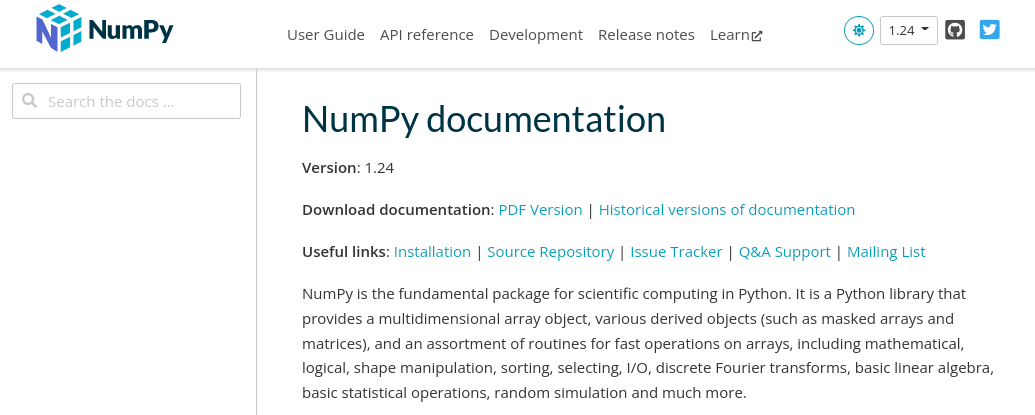Materials+ML Workshop Day 3¶
Day 3 Agenda:¶
- Questions about Day 2 Material
- Review of Day 2
Content for today:
- The NumPy package:
- Numpy Arrays
- Array Operations
- Matrix and Vector Operations
- The SciPy package:
- Scientific Constants
- Integration
- Optimization
The Workshop Online Book:¶
https://cburdine.github.io/materials-ml-workshop/¶
Tentative Week 1 Schedule:¶
| Session | Date | Content |
| Day 1 | 06/09/2025 (2:00-4:00 PM) | Introduction, Python Data Types |
| Day 2 | 06/10/2025 (2:00-4:00 PM) | Python Functions and Classes |
| Day 3 | 06/11/2025 (2:00-4:00 PM) | Scientific Computing with Numpy and Scipy |
| Day 4 | 06/12/2025 (2:00-4:00 PM) | Data Manipulation and Visualization |
| Day 5 | 06/13/2025 (2:00-4:00 PM) | Materials Science Packages, Introduction to ML |
Install Workshop Requirements:¶
Make sure you have installed the Python packages needed for this workshop:
Copy the command from cburdine.github.io/materials-ml-workshop/ in the Getting Started section.
pip install -r https://gist.github.com/cburdine/.../requirements.txt
Review: Day 2¶
Lists and Tuples¶
- Lists and tuples are ordered sequences of data
- Lists are mutable (they can be modified)
- Tuples are immutable (they cannot be modified)
In [10]:
# example of a list
my_list = [ 1, 2, 3, 4 ]
In [11]:
# example of a tuple
my_tuple = ( 1, 2, 3, 4 )
Sets and Dictionaries¶
- Sets store an unordered collection of unique objects
- Dictionaries store key-value pairs
In [13]:
# example of a set
my_set = { 'A', 'B', 'C', 'D', 'C'}
print(my_set)
{'C', 'A', 'D', 'B'}
In [15]:
# example of a dict
my_dict = { 'A' : 1, 'B' : 2 }
print(my_dict)
{'A': 1, 'B': 2}
Functions¶
- Python functions are reusable blocks of code that we can execute when it is called.
- Similar to mathematical functions, Python functions can have inputs, outputs, or even modify variables
In [1]:
# create a function to add two numbers:
def add_numbers(a,b):
total = a + b
return total # <-- output of function
# call `add_numbers` and store the output:
result = add_numbers(3,5)
print(result)
8
- Functions can also have default values:
In [2]:
def greet(name, message="Hello"):
""" Prints a greeting with a name and a message """
print(message + ', ' + name + '!')
# call greet with the default message:
greet('Albert')
# call greet with a non-default message:
greet('Albert', 'Greetings')
Hello, Albert! Greetings, Albert!
Python Classes¶
- Python classes serve as a kind of "blueprint" for a data type
- Instances of classes we create are called objects
In [2]:
class Dog:
""" This class represents a pet dog """
def __init__(self, dog_name):
""" Constructs a Dog instance with given name """
self.name = dog_name
def bark(self):
""" Causes this dog to bark """
print(self.name + ' says: "Woof!"')
- Creating Instances of classes calls the
__init__function - Other methods can be called by name
In [4]:
# construct a Dog object (calls __init__):
my_dog = Dog('Snoopy')
# change the `name` instance variable:
my_dog.name = 'Fido'
# call the bark() method:
my_dog.bark()
Fido says: "Woof!"
New Content:¶
- Installing and Importing Python Packages
- Scientific Python packages
- NumPy ("Numerical Python")
- SciPy ("Scientific Python")
Checking if Packages are installed¶
- The quickest way to check if a package is installed on your system is to import it:
In [17]:
import numpy # import the NumPy base package
In [18]:
import scipy # import the Scipy base package
- If either of these
importstatements results in an error, you will need to install the corresponding package.
Installing Python Packages¶
If a package is not installed on your system, you can install it using pip (the package installer for Python) on your system:
In [15]:
pip install numpy
Defaulting to user installation because normal site-packages is not writeable Requirement already satisfied: numpy in /usr/lib/python3/dist-packages (1.21.5) Note: you may need to restart the kernel to use updated packages.
In [16]:
pip install scipy
Defaulting to user installation because normal site-packages is not writeable Requirement already satisfied: scipy in /usr/lib/python3/dist-packages (1.8.0) Note: you may need to restart the kernel to use updated packages.
- On some systems, you may need to invoke your command shell:
In [13]:
!pip install numpy scipy
Requirement already satisfied: numpy in /media/colin/Shared/colin/git/materials-ml-workshop-notebooks/env/lib/python3.10/site-packages (1.24.3) Requirement already satisfied: scipy in /media/colin/Shared/colin/git/materials-ml-workshop-notebooks/env/lib/python3.10/site-packages (1.10.1)
Working with Packages¶
- When working with a package for the first time, it is helpful to read the package's online documentation
- Numpy package: https://numpy.org/doc/stable/
- Scipy package: https://docs.scipy.org/doc/scipy/

The NumPy Package¶
- Numpy is a numerical computing package in Python
- Numpy provides an interface to several mathematical functions
- Numpy supports multi-dimensional arrays for fast numerical computing
- These arrays are instances of the
numpy.ndarrayclass ndarrays can be used to represent vectors, matrices, tensors, etc.
- These arrays are instances of the
- Common practice is to import
numpywith the aliasnpat the beginning of a program:
In [19]:
import numpy as np
The SciPy Package¶
- Scipy provides many useful subpackages for scientific computing
- Subpackages you may find useful include:
scipy.constants: physical constants, unit conversionsscipy.optimize: functions for optimization and root findingscipy.integrate: functions numerical integrationscipy.stats: statistical analysis functionsscipy.special: special functions (e.g. Bessel functions, Ganna function, etc.)
Tutorial: The Numpy Package¶
- Math Functions
- Numpy Arrays
- Array Operations
- Linear Algebra
Exercises: The Numpy Package¶
- Solving a linear system
- Eigendecomposition
Tutorial: The Scipy Package¶
- Integration
- Optimization
- Special Functions
Exercises: The Scipy Package¶
- Resistivity of Metals
- Modeling the Resistivity of Platinum
Questions¶
Recommended Online Book Reading:¶
- Data Manipulation and Visualization
Bring your questions to our next meeting tomorrow!
